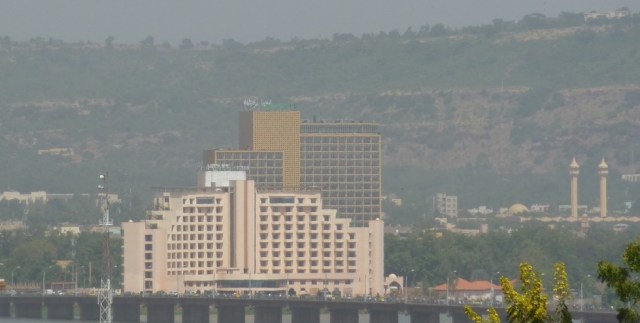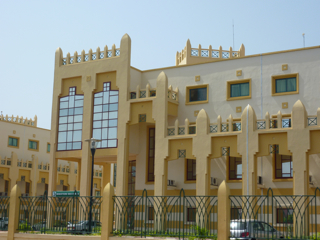“If Mr. Qaddafi is missed and mourned anywhere, it will be in Africa, where he bought friends far and wide. In Bamako, the capital of Mali, a new campus of government buildings bears Colonel Qaddafi’s name, and all the fancy hotels advertise their Libyan ownership with giant green neon signs on the upper floors.” – New York Times, Oct. 21, 2011
No doubt about it: if you want to hear kind words for Libya’s dead dictator, Bamako may be the best place to be. Since reports of Qaddafi’s demise first surfaced, it has been the buzz of the town. Commentators and editorialists throughout the region are heaping praise on the man. Two days after his death, the West African broadcaster Africable — more reliably a source of sleazy telenovelas and racy music videos than radical views — carried a gushing tribute on its Afrik Midi news show, describing Qaddafi as a revolutionary hero who, though martyred by the bullets of imperialism, will live on through his lofty ideals.
It is true that Bamako has a long history of support for, and from, Libya’s late leader. He did indeed fund a great many public projects here, from the above-mentioned government office complex (from which his name was actually removed in September after he was driven from power) to mosques and cultural centers.
Meanwhile Libyan interests have bought up many of Bamako’s biggest hotels and invested in thousands of hectares of agricultural land in the Malian interior (a move some critics described as a “land grab“). The Libyan Arab African Investment Company, or LAAICO, has become one of the biggest foreign investors in the Malian economy.
Perhaps there’s something to allegations that Qaddafi simply bought the loyalty of the people in these parts. But if you scratch the surface just a little, Malians’ views on the man and his legacy turn out to be much more complicated than they might appear. I should point out that there’s little that’s specifically anti-American in these views; on the whole, Malians and Africans tend to like the U.S. and millions of them want to emigrate there.
First of all, a fair number of people here actually saw Qaddafi as a brutal thug with no redeeming features. Many Malians accuse his government of having supported Tuareg rebels in northern Mali over the years, and he has been linked to numerous rebellions throughout the region. They recognize that he ruled at home with an iron fist, sowed strife abroad, and repeatedly kicked out Malian and other African migrants living in his country. As one reader commented on the Maliweb news site in response to the leader’s death, “Fali sara, boci banna” — literally, “Now that the donkey’s dead, its flatulence is over.”
Among those in Africa generally and in Mali in particular sympathetic to Qaddafi and his legacy, there are two camps. In one camp are the moderates, who point out that he managed to raise his people’s standard of living considerably; Libyans had access to government jobs and subsidized (free) housing. As somebody commented on Maliweb, “Qaddafi is the only leader to share his country’s wealth with the people.” Those in this camp might add that Qaddafi’s tyranny was not worse than that of several other governments around the world. They object to the way his corpse was displayed, and feel he at least deserved a fair trial.
In the other camp are those who, like Abdoulaye Barry, the Africable editorialist mentioned above, think the man could do no wrong. For them he was, more than anything else, a powerful symbol of African resistance to external domination. He was The Guide, a visionary ruler who espoused African unity in the face of Western hegemony. People in this camp see Qaddafi as a titan on par with Nelson Mandela. Qaddafi died, they will tell you, because the imperialists and neocolonialists resented his defiance and coveted his oil. And he died a worthy death, fighting to the bitter end. To listen to this narrative, you wouldn’t know that the man had been overthrown and, finally, killed by his own people with relatively little encouragement from the outside world. You wouldn’t know that he begged for his life. You wouldn’t know that Tripoli was thronged with jubilant crowds when news of his death emerged.
Many members of this second camp believe that “the media” conspired to misrepresent Qaddafi and his achievements, and to demonize him in the eyes of the global public. They see behind virtually everything that happens around the world the sinister hand of Western power. And anyone who dares stand up to the West — the Saddams, Chavezes, Ahmedinejads, and Mugabes of the world — has won their unending respect. Never mind these leaders’ mismanagement of their economies or what they may have done to their own people; it is enough that they said “no” to the great powers — unlike their own leaders. “Those who rule us are bought and paid for by the West; being African isn’t a source of pride like it was with [founding Presidents of Mali and Guinea] Modibo Keita, Sekou Toure and others,” wrote one commenter on Maliweb. There’s a fascinating research project waiting to be conducted on how people in Bamako judge political power and its legitimate application in geopolitics. I for one would love to know how people wind up in these various ideological camps.
A few members of the second category of Qaddafi supporters see nothing wrong with brutal leadership. As someone recently commented on Maliweb, “Qaddafi killed people, didn’t Bush kill people too? You [Malians] praise Samory, Sunjata, and Babemba [precolonial Malian rulers], didn’t they kill people? Please, one cannot govern without shedding blood. Do those who approve of killing Qaddafi think that the Libyan people are worth more than the Syrian people?” Statecraft in this view is an intrinsically violent affair, and those who criticize the abuses committed by some must ignore the abuses of others.
In explaining Qaddafi’s downfall, some Malians point to a Western plot against him; others see it as part of a wider uprising against dictatorship in the Arab world. But still others view things in more localist terms: a theory making the rounds in town holds that the Libyan leader’s fall from power stems from his acquisition of the Hotel Marietou Palace right here in Bamako.

Cursed? Bamako’s Hotel Marietou Palace, under Libyan ownership. (Background: The Hotel de l’Amitié, also owned by LAICO.)
In the late 1990s, a mysterious Malian billionnaire named Foutanga “Babani” Sissoko was the talk of Bamako. Sissoko’s mysterious aura grew from the fact that he never explained where and how he got his billions. His generosity was legendary. At the height of his power and fortune, he used to ride in a motorcade of Hummers down Bamako’s avenues (this was before anyone was driving Hummers except Arnold Schwarzenegger and the U.S. military); his minions would throw piles of banknotes out the windows to the crowds of people who’d line the streets waiting for him to pass by. He started up his own airline and named it after his hometown. And he purchased land on the edge of the Niger River in Bamako and began constructing a huge luxury hotel, the Marietou Palace, named after his mom.
Shortly after this acquisition, Sissoko’s luck suddenly changed. His fortunes dried up, his airline went under and he found himself under an international arrest warrant for fraud. The hotel’s facade sat unfinished, an empty carcass overlooking the river. It became a den of squatters and vagrants. And it stayed that way for several years.
In 2007, the Libyans bought the place. Or, as Malians like to say, Qaddafi bought it. (Malians have long personified all Libyan affairs in the figure of Libya’s late president. I’m not sure they were wrong to do so.) It took a few more years for work on the structure to resume. In fact construction on the hotel was still underway until recently, when (perhaps because of the unrest in Libya) work once again ground to a halt. And quite a few Bamakois have come to the conclusion that the hotel, or the site on which it stands, suffers from some kind of curse. Perhaps the builders inadvertently destroyed an animist shrine or power object when they cleared the site. Perhaps they somehow offended the water spirits that live in the river. In any case, by this logic, the Hotel Marietou Palace first brought down Babani Sissoko, and now it has brought down Qaddafi.
As an anthropologist, I don’t find it strange anymore that even educated, rational people should revere a brutal tyrant. Nor am I surprised that people link a troubled hotel project in Mali to a Libyan president’s fall from power. These are the kinds of ideas and thought processes that made me want to become an anthropologist in the first place.
I wonder if Libya’s new leaders will put the Marietou Palace on the market again soon. Anyone want to buy an unfinished hotel?
Postscript: As another example of how geopolitical events are often understood in localist terms, many Malians believe that Qaddafi’s mother was a Tamasheq from the Malian town of Kidal (some say Timbuktu). I have found no solid confirmation of this on the web, but I have found speculation that his mother was actually Jewish! Also, a protest march by Qaddafi’s many supporters in Bamako was scheduled for this Friday, to target the US and French embassies, but it was reportedly canceled over fears of violence and “bad publicity”.
Update, June 11, 2012: According to today’s edition of the state-run newspaper L’Essor, construction on the hotel (renamed “Hotel Afriqiyah” by its Libyan owners) has been completely halted since the end of the Qaddafi regime, and there’s no sign of work resuming anytime soon.
Update, August 27, 2016: The former Marietou Palace, still unfinished, is now under the management of a Moroccan firm named Iqtane, whose website displays promising images of what it hopes the hotel will look like someday in the indefinite future. Meanwhile some of Iqtane’s contractors in Bamako are reportedly pursuing legal action over alleged nonpayment of funds.


